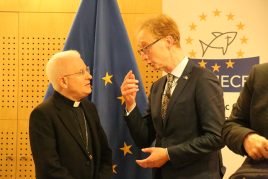
“If EU unity stops being strengthened, things could get worse for all. Nobody benefits from divisions, from a lack of unity.” This emphasis was reiterated by Monsignor Mariano Crociata, President of the Commission of the Catholic Bishops’ Conferences of the European Union (COMECE), the day after the European Parliament gave the green light to the new European Commission proposed by Ursula von der Leyen. On 27 November, while MEPs were voting in Strasbourg on Ursula von der Leyen’s second Commission, COMECE’s Autumn Plenary Assembly kicked off in Brussels. The Assembly brings together delegates from the Bishops’ Conferences of the EU until 29 November. The outcome of the vote in Strasbourg points to a rocky road ahead. In fact, with 370 votes in favour (out of a total of 719 MEPs), the new Commission received the narrowest support in the history of the EU.

Monsignor Crociata, what are your first impressions?
Firstly, it should be noted that this is the fulfilment of a task, and the fact that the Commission has been approved and can now begin its work is to be welcomed.
As for the slim majority, it is partly an inevitable consequence of the outcome of the elections, which is bound to characterise the five-year term.
However, this does not necessarily mean that things will get worse, that insecurity will increase or that only negative effects will be felt. Instead, there is scope to work towards building a broader consensus. And this is what the new Commission is expected to do.
What are the necessary conditions?
There are many, but a very important one, in my opinion, is the ability to identify and focus on the most pressing issues, while at the same time involving and motivating as much as possible. Setting goals is the next prerequisite. Von der Leyen outlined them both in her speech to Parliament prior to her reappointment and in her letter to the Commissioners. These goals include keeping Europe on track, but with a set of priorities. Above all the question of peace.
Europe has great potential, but divisions risk hampering its power to act.
Moreover, the issue of migration remains unresolved despite a specific Pact. Environmental sustainability is also at stake, as are the issues highlighted in the Draghi and Letta reports, which stress the urgency of boosting productivity and innovation. In short, these issues need to be addressed through participation and consensus in order to increase the majority, starting with the very issues on which all are expected to converge.
In your address to the COMECE Assembly, you mentioned a “worrying picture” for the European Union. What worries you most?
The possibility of the European Union becoming weaker and more fragmented. That is the danger. This is reason for concern because, unfortunately, given the numbers and attitudes, the conditions are in place for this to happen. This is not meant to be disheartening, but rather it means that we must react and create the conditions to prevent further divisions and instead build unity.
What does a weak EU mean today?
A single country cannot compete with the big state giants or the powerful multinationals.
Only by joining forces can a political, technological and economic entity emerge that can hold its own.
What do the Bishops of the European Union wish President Ursula von der Leyen today, in the light of the above-mentioned challenges and as the new Commission takes office?
Firstly, they wish her success in her new mandate, which includes addressing key issues, involving the citizens so that they feel that they are at the heart of the process, and involving the political groups. In other words, the political forces and European public opinion must be aware of the European Union’s efforts to respond to the needs and expectations that were expressed in the outcome of the elections – albeit in a contradictory and complex manner. It is an uphill struggle, so we hope that the Commission will work harder and remain convinced that the objectives can be achieved.









